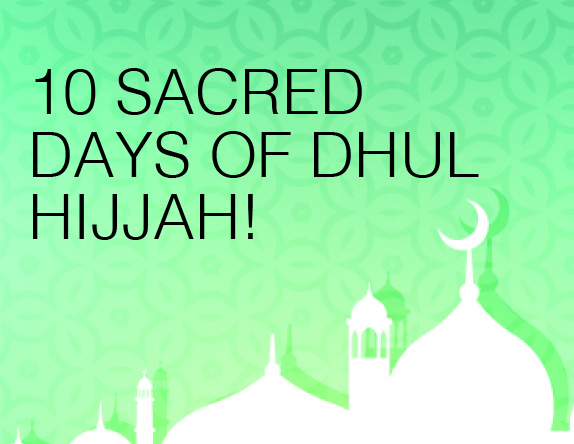
Don’t Miss These 10 Sacred Days of Dhul Hijjah!
Omar Suleiman
5-28-2025
 Email
to a friend Email
to a friend
 Post
a comment Post
a comment
 Print Print
In our fast-paced lives, the early hours of the day are often passed over without a second thought. We either rush through them or sleep right past them.
But in doing so, many of us are unknowingly turning our backs on a time full of divine blessing, as taught by the Prophet Muhammad PBUH.
This is especially true in the days leading up to Eid al-Adha—the first ten days of Dhul-Hijjah, the most sacred days of the Islamic year.
A Time When Most Are Asleep
It’s very important to pay attention to something that often goes unnoticed: the early morning hours, particularly after Fajr prayer. Most Muslims, after offering their Fajr, return to sleep. And if someone isn’t Muslim, they likely sleep through Fajr altogether. While resting at that time isn’t sinful, it is a missed opportunity. The moments after Fajr are among the most blessed and spiritually loaded times of the day.
The Prophet PBUH said, “O Allah, bless my nation in its early hours.” (Tirmidhi)
The early part of the day carries a special barakah (blessing), not just in our worship, but in our work, our intentions, and our mindset for the rest of the day.
So while it's okay to sleep after Fajr, don't do so without at least making du'a (supplication), offering adhkar (morning remembrances), and being present with Allah, even briefly.
The Power of Dhul-Hijjah: The Best 10 Days of the Year
We often hear about the last 10 nights of Ramadan—and rightly so. They contain Laylatul Qadr, the Night of Decree, a night better than a thousand months. But what many people don’t realize is that the first 10 days of Dhul-Hijjah are even more powerful in some ways.
Allah Himself swears by these days in the Qur’an:
“By the dawn, and the ten nights...” (Qur’an 89:1-2)
Many scholars agree that these “ten nights” refer to the first 10 days of Dhul-Hijjah. Ibn Abbas (may Allah be pleased with him) said, “There are no days in which righteous deeds are more beloved to Allah than these ten days.” (Bukhari)
These days include the most sacred day of the year: Yawm al-Nahr, the Day of Sacrifice on the 10th of Dhul-Hijjah. This is a time when acts of worship—prayer, fasting, charity, remembrance—are more rewarded than at any other time.
Day vs. Night: What's More Rewarded?
You might wonder: If the days are more sacred, why does the Qur'an mention the “ten nights”? The scholars point out that in the Arabic language of the Qur’an, days and nights are often interchangeable when describing sacred periods.
For example, in the story of Prophet Zakariya PBUH, Allah gives him a sign to remain silent for “three days” in one verse, and in another verse, it’s described as “three nights.” Both expressions refer to the same period.
So when Allah swears by “ten nights,” it includes both the days and the nights of Dhul-Hijjah. Together, they form a complete spiritual opportunity—one we should strive not to sleep through, literally and spiritually.
The Best Time of the Day: After Fajr
The Prophet PBUH said the two units of sunnah prayer before Fajr are better than the world and everything in it. He never missed them, even while traveling.
After praying Fajr, the Prophet would stay in remembrance until the sun rose. The Qur’an describes the Fajr recitation as being “witnessed”—by the angels of the day and night. If you begin your day with prayer, Qur'an, and remembrance, the rest of your day is likely to be filled with light and blessing.
The Best Time of the Night: Before Fajr
Even if you cannot stay up all night praying, try to wake up a few minutes before Fajr. This is the time Allah describes in the Qur'an:
“And in the hours before dawn they would ask forgiveness.” (Qur’an 51:18)
This last part of the night is when the sincere seek forgiveness—those who spent the night in worship, and those who didn’t. Even a few minutes spent in dua, repentance, or quiet reflection can have a profound effect on your heart and your life.
Dhul-Hijjah: A Season of Mercy People Often Miss
Just like Sha’ban—the month before Ramadan—gets neglected, the first 10 days of Dhul-Hijjah often pass unnoticed, despite their status as the best days of the year. Even with their immense reward, people tend to treat them like ordinary days. This is a major spiritual loss.
We should ask ourselves:
-
Did I prepare for these 10 days like I prepare for Ramadan?
-
Did I make an intention to fast some of these days?
-
Have I planned charity, dhikr, or extra prayer during them?
The Prophet PBUH used to fast the first nine days of Dhul-Hijjah, especially the Day of Arafah. He said, “Fasting on the day of Arafah expiates the sins of the past year and the coming year.” (Muslim)
-
The early hours after Fajr are filled with barakah—use them for prayer, remembrance, or setting a righteous tone for the day.
-
The last part of the night, just before Fajr, is a sacred time for repentance and du'a.
-
The first 10 days of Dhul-Hijjah are the best days of the year—don't let them pass like any other week.
Even a little effort—just 5–10 minutes of remembrance—can bring massive reward during this season.
Let’s not be among those who sleep through the best moments of the year. Wake up to the blessings, literally and spiritually. May Allah allow us to make the most of these sacred hours and days.
|